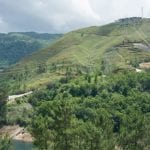December 10, 2019 — A major new energy innovation project to demonstrate how smart hydropower technologies can deliver a low-carbon, reliable and resilient power system was launched today.
The €18 million initiative was announced by the European Commission and a consortium of 19 partners, including the International Hydropower Association, at the United Nations climate change conference (COP25) in Madrid, Spain.
It will show how innovative and flexible hydropower systems can help countries across the world meet their renewable energy targets.
The XFLEX HYDRO (Hydropower Extending Power System Flexibility) project is a four-year initiative by leading utilities, equipment manufacturers, universities, research centres and consultancies. It will demonstrate how modern hydropower plants can provide the vital power grid services required by variable renewables such as wind and solar power.
The launch comes after a major UN Emissions Gap Report looking at ways to reduce global carbon emissions said that greater power system flexibility was “key” to integrating larger shares of variable renewable energy into the power supply.
The XFLEX HYDRO technologies to be tested are enhanced variable- and fixed-speed turbine systems, smart controls and a battery-turbine hybrid, each of which will be demonstrated at hydropower plant sites across Europe.
The project will conclude in 2023 by delivering a roadmap to increase adoption of the technologies across the hydropower fleet, with policy and market recommendations for governments, regulators and industry.
The initiative has received funding from the European Union’s Horizon 2020 research and innovation programme. It aims to help the EU achieve a target of achieving 32% of energy from renewable sources by 2030.
European Commission
Mr Patrick Child, Deputy Director-General for the European Commission’s Directorate-General Research and Innovation, commented: “Combining the excellence and expertise of 19 partners from across Europe, the XFLEX HYDRO project will test innovative solutions based on renewable energy sources that will provide greater flexibility and sustainability to the energy system.
“The project aims to increase hydropower’s potential in terms of plant efficiency, thereby boosting electrical power systems and enabling plant and system operators to operate more successfully in electricity markets. This can make an impactful contribution to European renewable energy objectives and policies.”
EPFL, project lead
Professor François Avellan of EPFL, the research institute and university leading the project, stated: “Across Europe countries are embracing large-scale electricity generation from renewables such as solar and wind power and shifting away from conventional fossil fuels for electricity generation. The growth in variable renewables is changing how power grids operate, with potential impacts on the stability and security on the whole power grid. This places unprecedented challenges on the hydropower sector to provide flexible and reliable services to the grid.
“The technologies demonstrated by the XFLEX HYDRO project will help hydropower to consolidate its critical role to support the integration of variable renewables into the power grid. This will ensure hydropower operators can maximise their performance and access future energy markets,” he added.
International Hydropower Association
Eddie Rich, Chief Executive of the International Hydropower Association (IHA), which is responsible for XFLEX HYDRO project communications, said: “We need to decarbonise the power sector, and fast, if we are to limit the devastating impacts of climate change. Last month’s UN Emissions Gap Report is a stark reminder that we need hydropower to boost the contribution of variable renewables like wind and solar. The XFLEX HYDRO initiative represents a clear commitment by the European Commission, leading organisations from the hydropower sector and academia to invest in new and innovative hydropower technologies.”
The XFLEX HYDRO (Hydropower Extending Power System Flexibility) project has received funding from the European Union’s Horizon 2020 research and innovation programme under grant agreement No 857832. The EU contribution is €15,103,379.
The project will be launched at the 25th UN Climate Change Conference in Madrid, Spain, on 10 December 2019. The climate conference brings together governments and representatives from business, academia and civil society. To request an invitation to the launch please contact will.henley@hydropower.org.
Over the next four years, XFLEX HYDRO innovations and technologies will be demonstrated at the following European hydropower plant sites: Z’Mutt in Switzerland, Grand Maison and Vogelgrün in France, and Frades 2, Alqueva, Alto Lindoso and Caniçada in Portugal.
The UN Emissions Gap Report, stating that power system flexibility is key to integrating larger shares of variable renewable energy into the power supply, was published by the United Nations Environment Programme on 26 November 2019.









